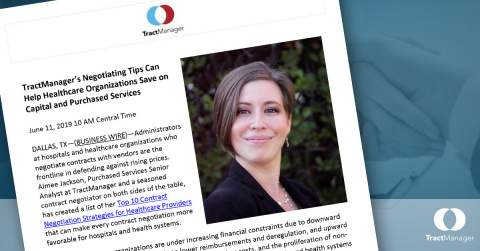DALLAS--(BUSINESS WIRE)--Administrators at hospitals and healthcare organizations who negotiate contracts with vendors are the frontline in defending against rising prices. Aimee Jackson, Purchased Services Senior Analyst at TractManager and a seasoned contract negotiator on both sides of the table, has created a list of her Top 10 Contract Negotiation Strategies for Healthcare Providers that can make every contract negotiation more favorable for hospitals and health systems.
Today’s healthcare organizations are under increasing financial constraints due to downward pricing pressures that are attributable to lower reimbursements and deregulation, and upward cost pressures including rising pharmaceutical prices, labor costs, and the proliferation of non-labor spend across hundreds of purchased service categories. U.S. hospitals and health systems are trying to balance an impossible triad of managing financial pressures while investing in technological innovation and improving the quality of care and patient outcomes.
With expenses rising and revenue growth hard to come by, accurate, real-time data combined with vendor negotiation skills can significantly impact the cost curve. Deploying proven contract negotiation strategies can help hospitals stretch their dollars, increase value, and achieve desired savings while improving their relationships with vendors.
In one of Jackson’s tips, Bartering for Clauses, she advises that contract clauses are like negotiating chips: “To negotiate the best deal for your organization, you need to understand the total cost of your contract. That entails looking beyond the big-ticket items and zooming in on what may look initially like small change. Often, these expenses are buried or only implicit in specific contract clauses.”
Jackson’s favorite tactic, The “Judge Judy” Method, advises that “ignorance” — real or feigned — can work to your advantage. “I soon discovered that vendors were disarmed when I openly admitted that I didn’t know nearly as much as they did, and I would be asking a lot of ‘dumb questions,’” she says. “Once the vendor dropped their guard, they became an open book. Never underestimate the power of curiosity, and the dogged pursuit of complete transparency.”
“Success at the negotiating table is key to controlling healthcare costs,” notes Barry Dyer, Senior Vice President of Consulting at TractManager. “Aimee’s ability to boil down her vast negotiation experience into a few easy-to-digest tips will help anyone in this situation approach such a discussion with a game plan. At TractManager, we are uniquely positioned to help clients optimize their purchased services spend. As a large Mid-Atlantic health system client told us: ‘We were frankly surprised at the amount of savings [TractManager] helped us achieve. [The organization] set a year one goal of negotiating $10 million in purchased services cost reductions. After only two projects, we’re halfway there.’”
Healthcare administrators are invited to read more about these proven techniques, which address not only cost savings, but also ways to strengthen contracts and shift the conversation at the negotiations table in their favor.
To read this engaging piece about the serious business of negotiation, Top 10 Contract Negotiation Strategies for Healthcare Providers, visit the TractManager website. Then listen to our on-demand webinar to hear Jackson and TractManager colleague Brandon Baca discuss ways to make your next contract negotiation successful.
ABOUT TRACTMANAGER
TractManager’s technology-enabled services and solutions serve three out of five U.S. hospitals, helping transform the business of healthcare by driving down costs, decreasing risk, and enhancing value and performance across healthcare organizations. Serving the healthcare industry with integrity for more than 30 years, we offer a comprehensive suite of evidence-based research, strategic sourcing, and contract lifecycle management solutions that deliver full visibility into spending, expense management, reimbursement, clinical effectiveness, contractual obligations, and potential liability. We are dedicated to helping our clients reduce their capital and non-labor costs, and conform their contract, policy, and procedure management to meet regulatory requirements.




